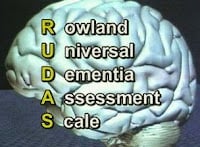A written Alzheimer’s test, developed by Douglas Scharre, MD, of Ohio State University Medical Center, is designed to evaluate every part of a patients brain, from language to memory to problem solving.
Free & Simple
The free and simple 15-minute self-administered test to screen for early dementia could help speed diagnosis and treatment of memory disorders, including Alzheimer’s. It could also provide health care providers and caregivers an earlier indication of life-changing events that could lie ahead. (Continued below video…)
The handwritten self-assessment, which can take less than 15 minutes to complete, is a reliable tool for evaluating cognitive abilities.
Findings confirming the validity of the tool are reported in the Journal of Neuropsychiatry and Clinical Neurosciences, as well as in the journal Alzheimer Disease and Associated Disorders.
Strong Verification
These studies gave such strong verification of the SAGE test that the former study’s publication sent the test viral upon its release. That day’s sudden surge in demand for the SAGE test was so huge that it crashed the computer servers at Ohio State University.
Dr. Douglas Scharre, a neurologist at the Ohio State University Medical Center, developed the Self-Administered Gerocognitive Examination (SAGE) to help identify individuals with mild thinking and memory impairments at an early stage. The research shows four out of five people (80 percent) with mild thinking and memory (cognitive) issues will be detected by this test, and 95% of people who are normal thinking will have normal SAGE scores.
Scharre, who specializes in treating Alzheimer’s disease, said treatments for Alzheimer’s and dementia are more effective when they are introduced in the earliest stage of the disease.
Unfortunately, he said he often sees patients more than three to four years after the first symptoms of a cognitive impairment began to appear.
Dr. Shcarre said, “It’s a recurring problem.”
People Don’t Come Early Enough
“People don’t come in early enough for a diagnosis, or families generally resist making the appointment because they don’t want confirmation of their worst fears. Whatever the reason, it’s unfortunate because the drugs we’re using now work better the earlier they are started.”
Many of the assessment tools for cognitive disorders being used today, while accurate, have aspects that deter their use. “Seldom are physicians reimbursed for the time and effort it takes to give such tests, or they tie up personnel to physically administer the test,” said Scharre, who advocates the use of routine screening for cognitive disorders in the primary care setting. Other diagnostic tests require the patient to use a computer, which can add heightened anxiety to some older adults who may be infrequent users of technology.
Scharre added, “The SAGE self-assessment is a practical tool for a busy primary care office.”
Where to Get the Dementia Test
The test is available free of charge to healthcare personnel at the following link:
To download the test, go to:
- https://wexnermedical.osu.edu/brain-spine-neuro/memory-disorders/sage
or click here:
SAGE: A Test to Detect Signs of Alzheimer’s and Dementia
How to interpret the results:
Examinees who download SAGE from the Internet and take it at home are instructed to bring their completed test to their primary care physician. Scoring instructions and explanations for physicians are below:
RUDAS is an Easier Dementia Test
It only takes a paper, pen and a few minutes to take the test and because it’s self-administered, it doesn’t necessarily take time away from the appointment.
Dr. Scharre said, “They can take the test in the waiting room while waiting for the doctor.”
Missing six or more points on the 22-point SAGE test usually warrants additional follow-up by the physician. Abnormal results can also prompt an early search for reversible and treatable conditions that may be causing the patient’s thinking and memory impairment. Many conditions besides Alzheimer’s disease, such as strokes and some thyroid conditions, can also impact memory, according to Scharre.
Cost Savings
Scharre said there are potential cost savings to using the tests in a primary care setting. He reasons that a person who fares poorly on the self-exam will likely be less compliant taking medications on time, taking them in the proper dosages or following other recommendations such as maintaining healthy diets.
Dr. Scharre pointed out, “Abnormal test results can serve as an early warning to the patient’s family.”
“The results can be a signal that caregivers may need to begin closer monitoring of the patient to ensure their safety and good health is not compromised and that they are protected from financial predators.”
Compares Favorably to Competing Tests
Results of the new test compare favorably with current standard cognitive assessments that are not self-administered. To validate the exam’s findings and accuracy, Scharre and other researchers at Ohio State evaluated study participants using SAGE, and then evaluated the same subjects with a battery of other established and well-documented assessment tools.
The study involved 254 study participants, 59 years of age or older, who took the SAGE self-assessment. Sixty-three (63) individuals were randomly selected to have a one-day clinical evaluation utilizing a battery of physical, neurological and cognitive tests.
SAGE scores compared favorably with the mini-mental state examination (MMSE), a brief questionnaire test that is commonly used in medicine to screen for cognitive impairments and dementia.
Both tests were able to differentiate clinically defined normal and mild cognitive improvement from subjects with dementia. However, SAGE, but not MMSE, was also able to distinguish between clinically defined normal from the mild cognitive improvement group.













I am not able to load this stuff down.
Can you pass on snør her link please?
I am a moderator in a quite large Norwegian FB group supporting and guiding persons living with people suffering from Akzheimers or Dementia .
Irene would be great idag someone woulď
pass on a link.
❤🥰
Hi Vibecke,
The links all work now. Sorry for the inconvenience, the University moved these web pages, and they are now all updated.
Tried the link to get to the test and it never would load. Checked my internet connection and all is good there, so wondering what the problem might be?
The link FINALLY worked–had to switch internet engine in order for the site to finally load up.
I just tool the test and just wanna say both tests are designed to make differentiate clinically. Cognitive improvement from subjects with dementia. I really enjoyed reading through. Thanks for sharing such test opportunity.
Took the test. How to evaluate my results?
Scoring instructions for doctors are at:
http://medicalcenter.osu.edu/pdfs/sage/sage-scoringinstructions-us.pdf
A scoring explanation for doctors is at:
http://medicalcenter.osu.edu/pdfs/sage/sage-infosheet-us.pdf
How about scoring explanation for non doctors?